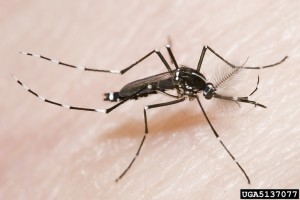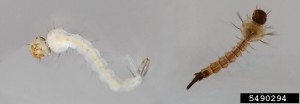Are you plagued with mosquitoes in your yard? Does it seem like you have a greater infestation than your neighbors? There may be some solutions to solve the problem other than using pesticides that negatively impact beneficial insects in your landscape.

Mosquitoes are not only annoying, they can transmit serious diseases such as: eastern equine encephalitis, dengue fever, dog or cat heartworm, chikungunya, malaria, St. Louis encephalitis and west Nile virus.
Let’s first explore what kind of environment in your landscape and around your home is friendly to the proliferation of mosquitos. Adult mosquitoes lay their eggs on or very near water that is still or stagnant. That is because the larvae live in the water but have to come to the surface regularly to breeze. The small delicate larvae need the water surface to be still in order to surface and breathe. Water that is continually moving or flowing inhibits mosquito populations.
Look around your home and landscape for these possible sites of still water that can be excellent mosquito breeding grounds:
- bird baths
- potted plant saucers
- pet dishes
- old tires
- ponds
- roof gutters
- tarps over boats or recreational vehicles
- rain barrels (screen mesh over the opening will prevent females from laying their eggs)
- bromeliads (they hold water in their central cup or leaf axils)
- any other structure that will hold even a small amount of water (I even had them on a heating mat in a greenhouse that had very shallow puddles of water!)

You may want to rid yourself of some of these sources of standing water or empty them every three to four days. What if you have bromeliads, a pond or some other standing water and you want to keep them and yet control mosquitoes? There is an environmentally responsible solution. Some bacteria, Bacillus thuringiensis ssp. israelensis or Bacillus sphaericus, only infects mosquitoes and other close relatives like gnats and blackflies and is harmless to all other organisms. Look for products on the market that contain this bacteria.
For more information:
UF/IFAS Mosquito Information Website
Biological Control of Mosquitoes
 0
0
